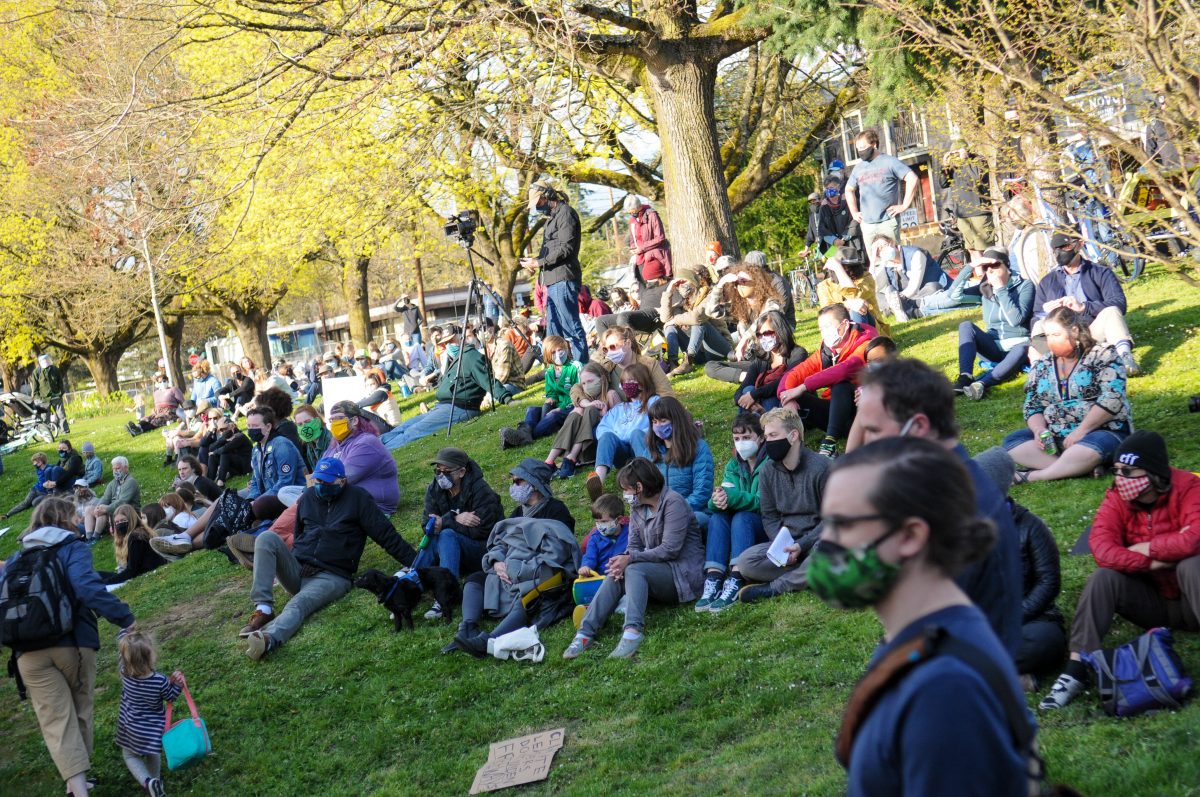

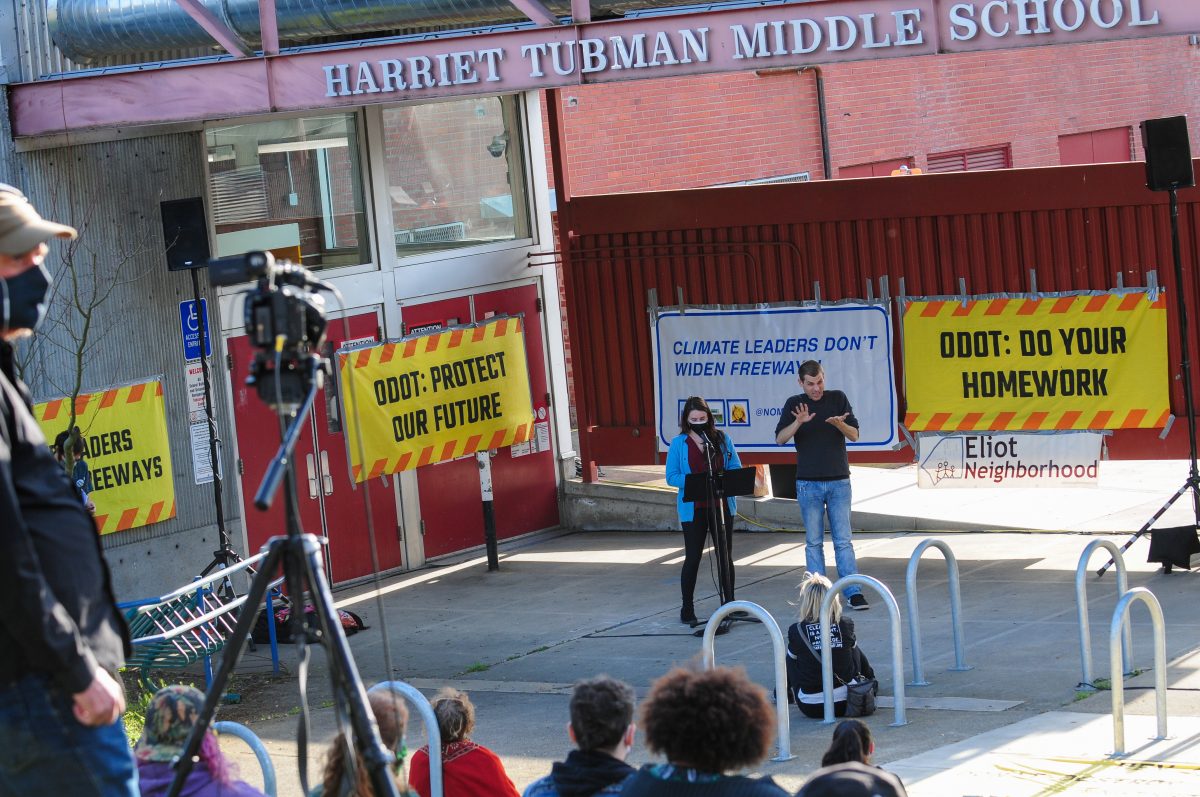
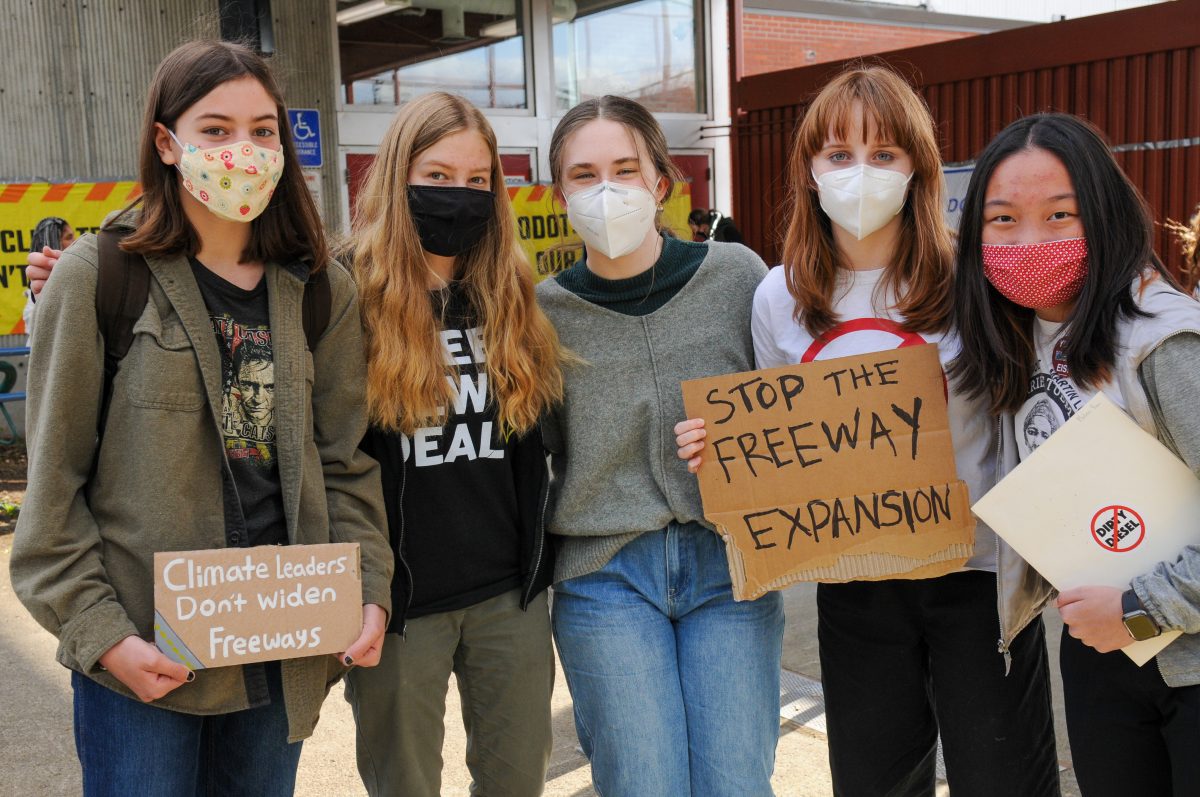
“We can literally see the smog in the air during recess… This freeway is constantly on our minds, and it is in our lungs, and it is a direct threat to the heart of the Tubman community.”
— Malina Yuen, 9th grader and Tubman graduate
Portland’s freeway fight spread its wings as it traded the confines of social media and online meeting testimony for a well-attended rally on Friday evening. Dozens of speakers and organizers joined with about 150 attendees at Harriet Tubman Middle School within earshot of the section of freeway the Oregon Department of Transportation wants to widen as part of their I-5 Rose Quarter project.
A trio of nonprofits launched a lawsuit against the project on Monday, citing ODOT’s failure to fully examine environmental impacts and lack of willingness to consider other, less-polluting design options. The rally was billed as a celebration of the lawsuit, and it certainly was; but it also felt like a coordinated indictment of capitalism, the destructive impacts of freeways, and the state agency that loves widening them.
The crowd was a diverse mix of ages, races, and styles. Toddlers doodled with chalk on the pavement at the school entrance, using it to embellish phrases like “Climate Leaders Don’t Widen Freeways” with rainbows and flowers.
Advertisement
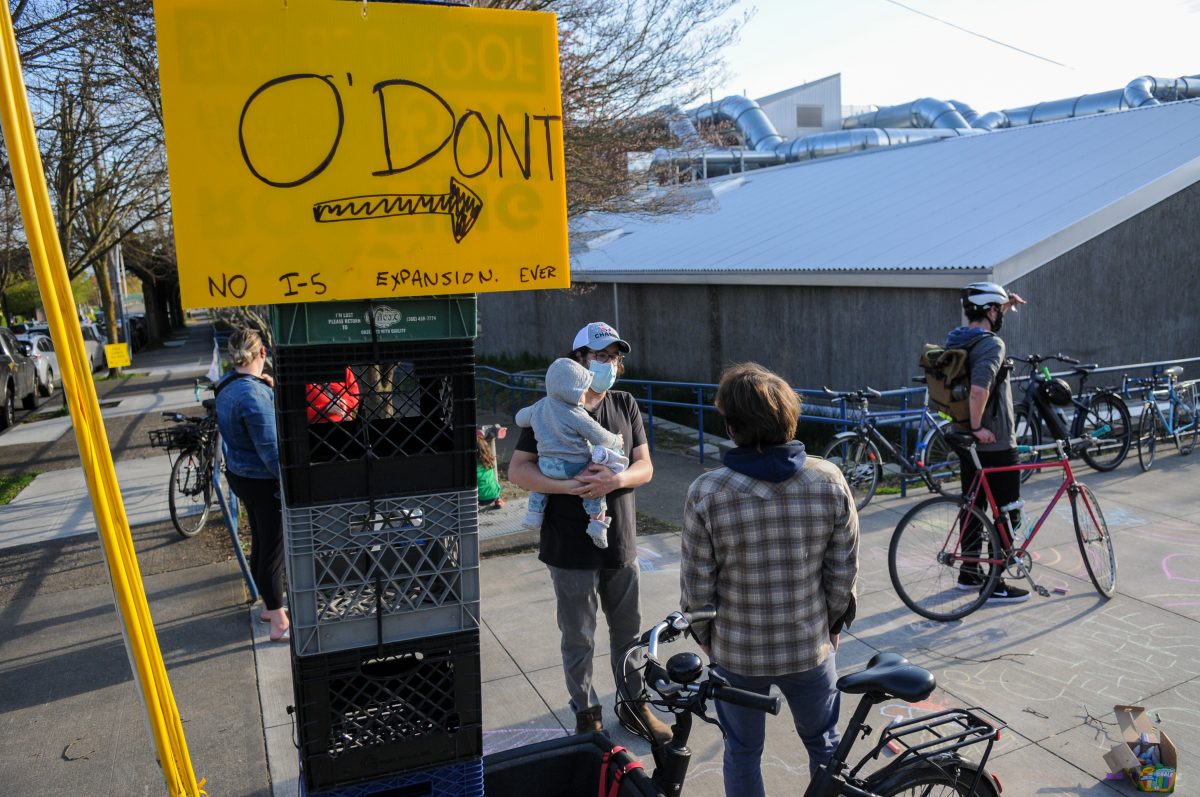
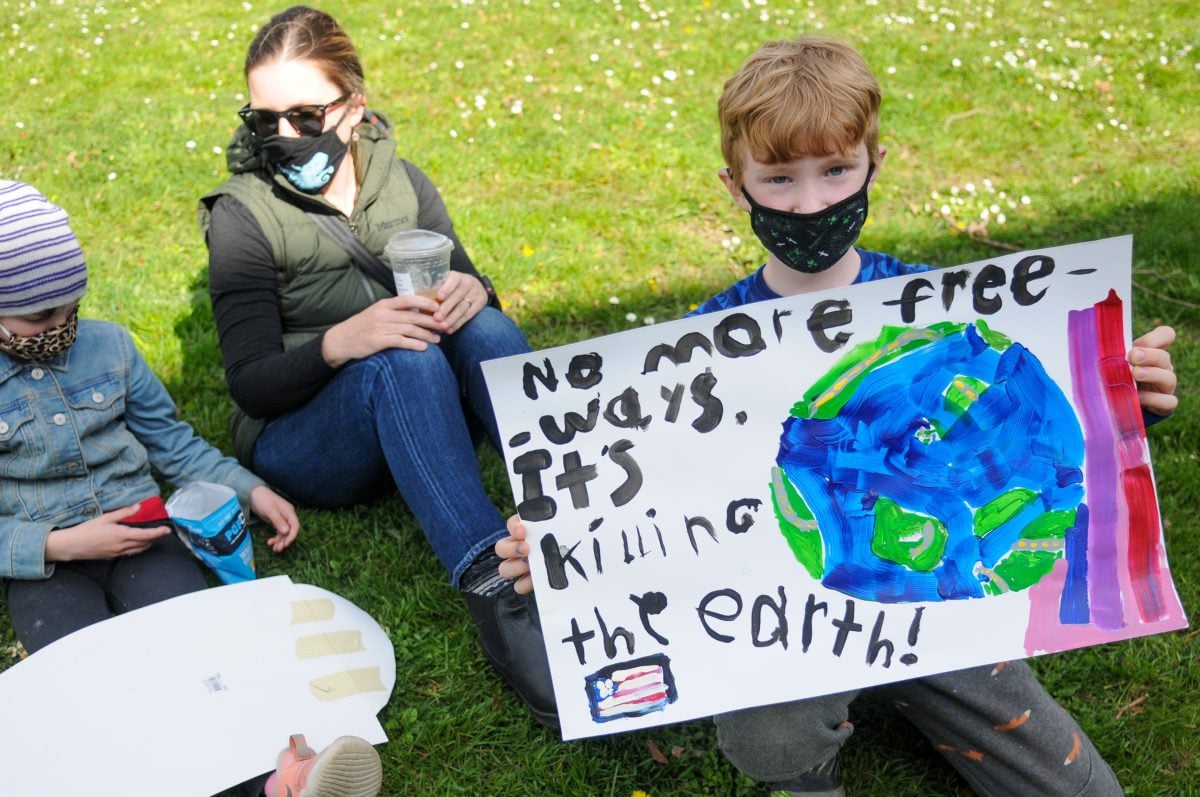

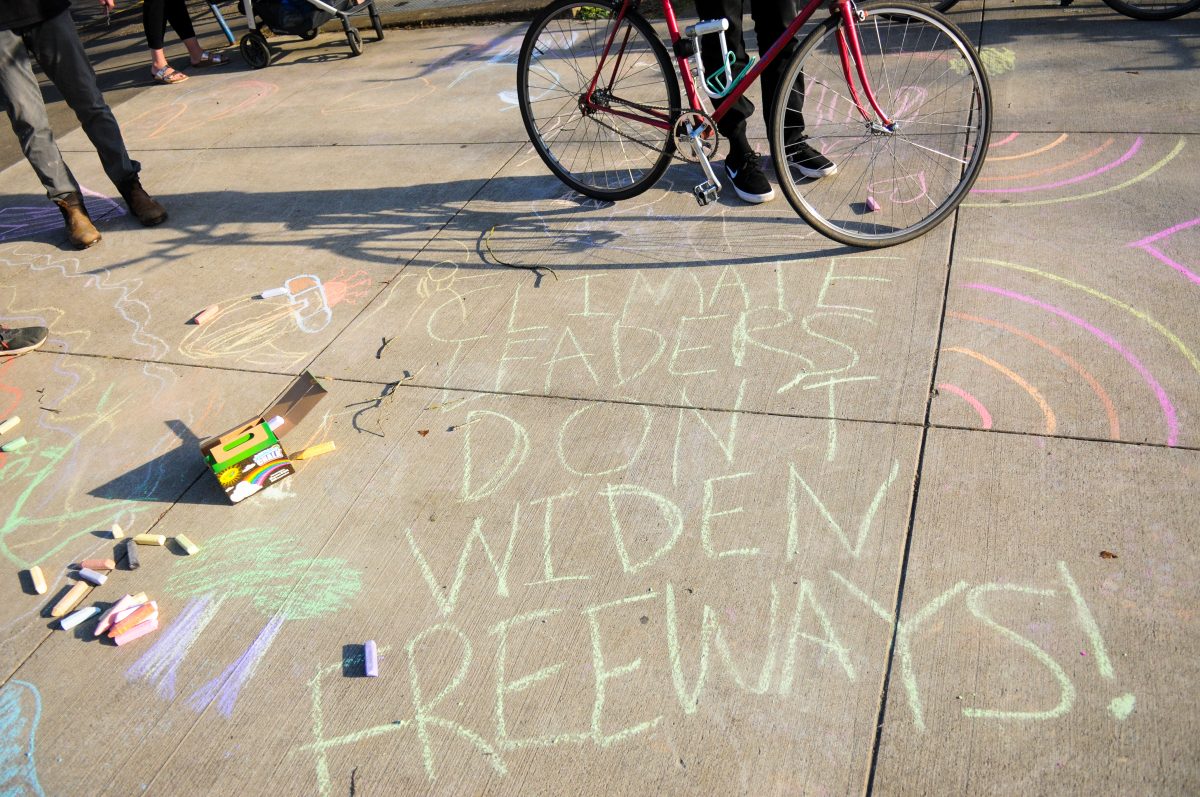
Before a bevy of speakers riled up the crowd, volunteers with Sunrise PDX gathered hand-written postcards from attendees. The nonprofit No More Freeways, the lawsuit’s lead protagonist, had created the cards with custom messages to four key leaders: Oregon House Speaker Tina Kotek, Portland Commissioner Jo Ann Hardesty, Oregon Governor Kate Brown, and US DOT Secretary Pete Buttigieg.
With the pandemic still in effect, it was strange to attend an in-person event of this size. It was the largest gathering of transportation advocates for well over a year. Rally organizers took full advantage.

“I’m with an organization called No More Freeways and we just sued the federal government!” said lead rabble-rouser Aaron Brown triumphantly at the outset of the event.
A person named Tad, who was introduced by Brown as an “indigenous climate justice warrior” started off a slate of speeches with an impassioned plea against capitalism and a return to the values of his tribal ancestors. “Where is our climate justice? Where’s our transportation justice? I’ll tell you where: There is no justice on stolen land!”
The dire environmental impacts of the existing freeway and the potential of more damage from a wider one were a major theme.
Advertisement

Neighbors for Clean Air (NCA), another plaintiff in the lawsuit, explained that ODOT’s plans would bring freeway-using vehicles to within 30 feet of the school. “[Portland Public Schools] has been forced to spend $12 million [on a ventilation system] to reduce the health impacts of students and teachers,” said NCA’s Tori Heroux. “Children are most vulnerable to the long-term impacts from traffic because their lungs are still developing. And on average, children breathe about 50% more air per pound of bodyweight than adults do.”
What has helped spur a grassroots insurrection against this project isn’t simply a big, dirty freeway. It’s the intentional and racist choices made over generations by state and local officials to build highways through north Portland at the expense of historically black neighborhoods.

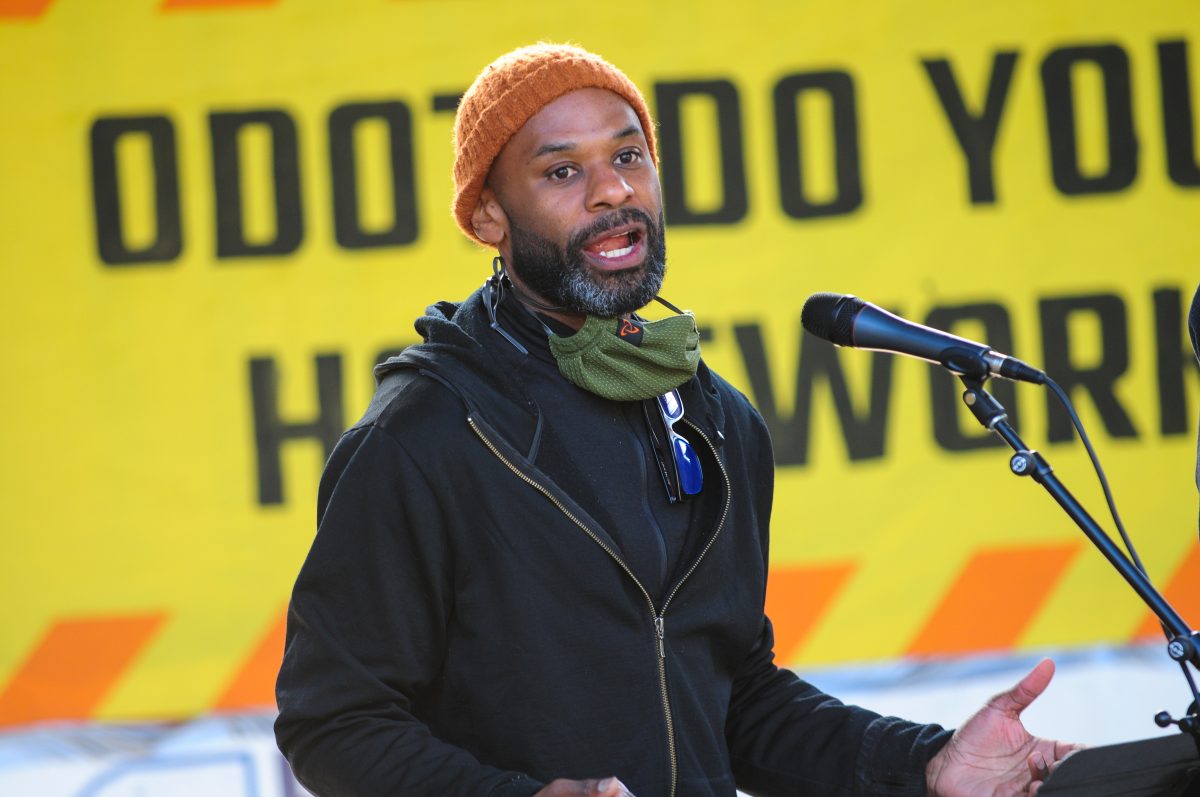
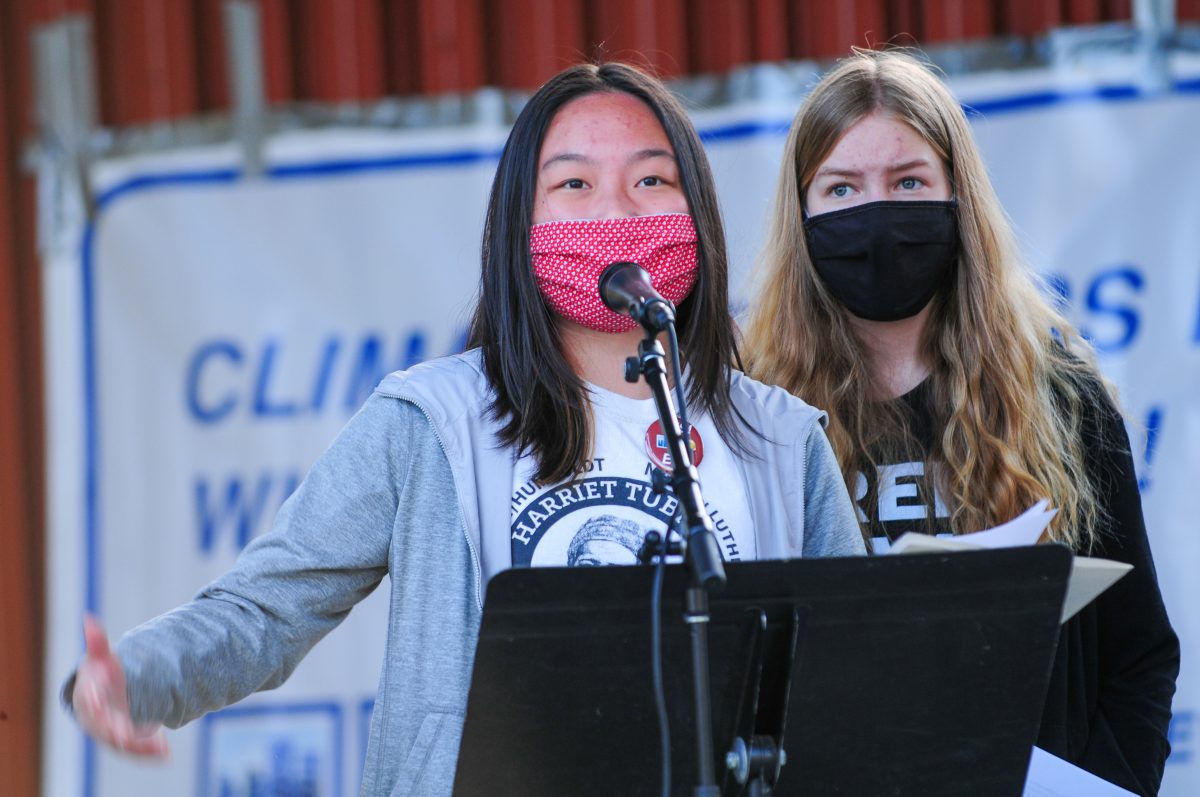

Joe Cortright, an economist and founding member of No More Freeways, told the crowd how a series of major highway projects starting in the 1950s decimated people’s homes and lives (he riffed off an article he recently published on City Observatory). “In 1950, 14,000 people lived in the Albina Neighborhood. In 1970, only 4,000 people lived here. This neighborhood was devastated by freeway construction and it’s ironic that ODOT is coming back and pretending that they’re offering restorative justice to the neighborhood by widening the freeway. Only a highway engineer would think you could fix the problem by making the freeway bigger.”
Symbolic of the diversity of opposition to this project, Cortright’s speech was followed by someone one-third his age. 21-year-old Sharona Shnayder is a Portlander and environmental activist who leads a global effort to pick trash.
“ODOT should be ashamed… for having the audacity to propose an action to expand this problem, to strangle these kids and their futures even further,” Shnayder said to rousing applause. “What’s frustrating about this situation is knowing that these children can’t even drive yet, yet they’re the ones who have to breathe the polluted air caused by all of those passing by just feet away from their classrooms… This is about a lack of morality. It’s about a lack of ethics. This is a lack of consciousness, knowing that we have a choice to do the right or the wrong thing, but are consistently choosing to do the latter.”
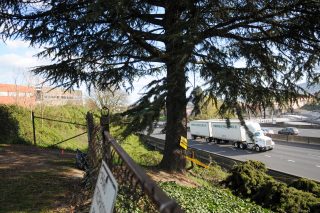
“There’s no room for compromise here. No freeway! No way! You’ll hear us! You’ll pay!”
Gerald Scrutchions knows how the freeway impacts the school because he teaches there. Wary of the impacts of unfiltered diesel engines, one day he counted how many passed by his classroom. It was 15 in one minute. “By a conservative estimate, I came up with about 10,000 diesel trucks passing a day,” Scrutchions said.
“We are in a school that claims to have the cleanest air quality in the city of Portland [due to a state-of-the-art ventilation system]. However, we seal the windows shut. Outside of the school is some of the worst air quality in the country.”
One of Scrutchions’ former students is Malina Yuen. Now a 9th-grader, she’s graduated from Tubman Middle School, but she’s one of the leaders in the fight to protect it from the freeway. Yuen knows about those dirty trucks all too well. “We can literally see the smog in the air during recess. On bad days kids with asthma were afraid to even come outside,” she shard. “This freeway is constantly on our minds, and it is in our lungs, and it is a direct threat to the heart of the Tubman community.”
Yuen’s friend and partner-in-activism is Adah Crandall. She was equally as forceful and effective in her words against ODOT. “It doesn’t take an expert to see that adding more lanes means more people driving, and more people driving means more pollution… Even the sixth graders at Tubman can understand this concept of induced demand; and for some reason, ODOT still cannot!”
If you missed the rally, check the full recording below (provided by No More Freeways):

— Jonathan Maus: (503) 706-8804, @jonathan_maus on Twitter and jonathan@bikeportland.org
— Get our headlines delivered to your inbox.
— Support this independent community media outlet with a one-time contribution or monthly subscription.


